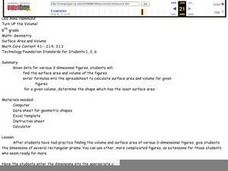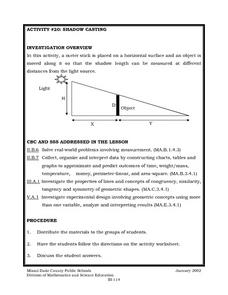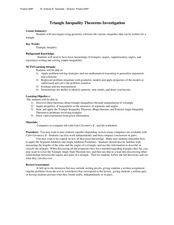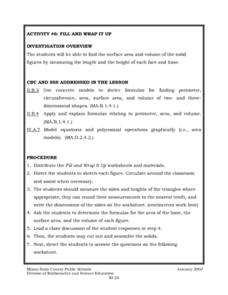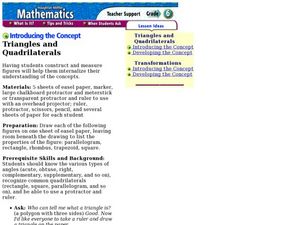Exploratorium
Rotating String Shapes
Here is a very interesting way of studying triangles and polygons. Pupils work together and use pieces of string to create a variety of shapes. Depending on how many kids are manipulating the string at any one time, the number of...
Curated OER
Range, Cluster, Gap and Outliers
There are a number of activities here where learners collect and record data, as well as, activities where the likelihood of an event happening is calculated given the experimental probability. Young statisticians organize information...
Berkshire Museum
Where’s the Water?: Acting Out Science Cycles
Young scientists transform themselves into rivers, oceans, clouds, and drops of water in order to explore the water cycle. After assigning and explaining to students their different roles in the activity, the teacher reads aloud a...
Baylor College
Heart and Lungs
With a partner, youngsters measure their pulse and breathing rates, both at rest and after running in place for a minute. While this activity is not novel, the lesson plan includes a large-scale classroom graphing activity and other...
Curated OER
Frost Depth Study
Students complete activities to study the frost and frost depth. In this frost study lesson, students use frost tubes to study and measure the frost at their school. Students measure the frost in the tube and enter their data online to...
Curated OER
Pacing a Gunther Chain
Students pace a Gunther Chain, a measurement used by foresters to determine distance and area. They discuss that pacing is individualized depending on age, gender, etc. They practice to find an average pace. Teams estimate, pace and...
Curated OER
Turn Up the Volume
Measuring volume can be a mystery for 5th graders, but this hands-on activity gives the gift of discovery. The volume of simple rectangular solids and irregular shapes are calculated through various methods including displacing liquid in...
Curated OER
Pythagorean Theorem
In this measurement lesson, learners examine the Pythagorean Theorem, perimeter, and areas of right triangles. They record their measurements and research their findings on a grid.
Curated OER
"Math Curse" by Jon Scieszka
Students practice estimation skills for measurement, and work with metric units of measurement.
Curated OER
Measuring Length and Width
Second graders practice measuring length and width of objects in inches. In this measurement lesson, 2nd graders use a ruler to measure the length and width of a chair, desk, and book. Students view a video, "Math Investigations II," to...
Curated OER
Fun Creative Activities that Teach Math
Students have fun with math. In this math skills lesson, students collaborate to solve the problems presented in this interactive lesson. The problems pertain to geometry, measurement, probability, number sense, and algebra.
Curated OER
Math is Everywhere: Part 2
Second graders identify shapes and measurements in everyday life. In this measurement lesson, 2nd graders locate rectangles in their classroom and use standard and nonstandard forms to measure them. Students view a video clip...
Curated OER
What's Your Average? What Do You Mean? I'm More Than Just Average
Upper grade and middle schoolers collect data, analyze and interpret the data. This three-part lesson should provide learners with a firm understanding about the differences between mean, median, and mode and how to perform the...
Curated OER
Angles - Digger and the Gang
Students explore angle estimation and measurement. In this angle lesson, students define obtuse, acute, and right angles, and practice measuring angles using a protractor. Students participate in an online angle estimation activity.
Curated OER
Introducing the Concept: Proportions
Students measure distances. In this proportions lesson, students use a map to find how far it is between different cities. Students use their knowledge of measurement, multiplication and fractions to find the distances.
Curated OER
Pumpkin Problems
Students participate in a lesson that has the intention of working on estimation skills. They use pumpkins to estimate the number of seeds are inside. They collect data for each pumpkin and compare it to the estimation. Students question...
Curated OER
How Big Is Your Head?
Students explore measurement by measuring classmates' heads. They record their measurements and they put the measurements in order from smallest to largest. Students figure the mean, median, mode, maximum, minimum, and range of their...
Curated OER
Shadow Casting
Eighth graders use a meter stick that is placed on a horizontal surface and an object is moved along it so that the shadow length can be measured at different distances from the light source. They solve real-world problems involving...
Shodor Education Foundation
Surface Area of Rectangular Prism
With this interactive lesson, learners compute the surface area of rectangular prisms. They visit an online investigation applet and record data on the provided handout. Pair this lesson with the volume lesson by the same publisher as an...
Curated OER
One Hundred Things
Learners practice estimating by handling items in groups of ten. They visualize how much space 100 items, such as pennies, peas, or beans, will take up after holding 10 of them. Students measure the difference in volume between 10...
Curated OER
Triangle Inequality Theorems Investigation
Students estimate and measure triangles. In this geometry lesson, students identify the relationship between three sides and a triangle. They use the inequality theorem to decide if a triangle will be formed or not.
Curated OER
A Measure of Greatness
Students participate in a variety of Olympic themed activities in order to measure their results. For this measurement lesson, students participate in cotton ball shot put, paper plate discuss throw, and other events to have fun while...
Curated OER
Fill and Wrap It Up
Middle schoolers find the surface area and volume of the solid figures by measuring the length and the height of each face and base. They use concrete models to derive formulas for finding perimeter, circumference, area, surface area,...
Houghton Mifflin Harcourt
Introducing the Concept: Triangles and Quadrilaterals
Guide your geometers through the process of constructing polygons. They learn how to draw triangles, squares, parallelograms, rectangles, rhombuses, and trapezoids with specified angles using a protractor and a ruler. The lesson plan...






